One of the most reliable aspects of working in a university archives is that no two days are the same. Every day one can expect surprises, an unexpected challenge or a serendipitous connection that can send an archivist (or a researcher) down a rabbit hole of discovery.
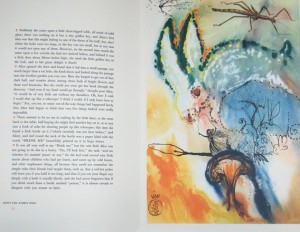
Page 14 and print from Alice’s adventures in Wonderland / by Lewis Carroll, with illustrations by Salvador Dali. – New York : Maecenas Press, 1969.
Perhaps it's no coincidence that one of the most popular items in the Special Collections is our edition of Alice in Wonderland!
To mark Archives Awareness Week, here's a summary of some of our department's activities over the course of a work week. Typically, archival institutions like the Clara Thomas Archives & Special Collections perform several key activities: we acquire and accession donations or transfers of records; we appraise such donations for permanent retention (or facilitate such activities at arms-length); we arrange and describe our holdings; we preserve and ensure the security of our holdings and we facilitate access and use of our holdings through our public reading room, teaching, curriculum integration and promotional activities.
April tends to be a hectic month for us. Although the rest of the campus is winding down with final exams, we are trying to wrap up 2013 donations and complete appraisals of all those donations that are eligible for tax receipts.
We don't do much teaching in April (the bulk of our instructional sessions happens in the Fall term and before March), but rather prepare for summer classes that have booked (or we anticipate booking) an orientation session in the reading room. We also tend not to accept any new donations or accruals in April simply because we're so busy wrapping up 2013 donations, we don't have the space to accommodate another skid of boxes.
So, without further ado, we present:
A Week in the Archives...
...as recalled by Michael Moir, university archivist, Suzanne Dubeau, assistant head archivist, Anna St.Onge, archivist, digital projects and outreach and Julia Holland, archives technician...Monday
Mondays tend to be a bit of a catch-up from the previous Friday, or any additional work completed over the weekend. This Monday, some of our activities included:
-
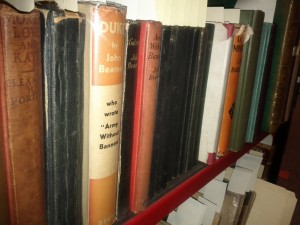
A selection of items recently digitized by the Internet Archive. 12 April 2014.
Evaluating, re-shelving and confirming the metadata of a shipment of rare books we sent down to The Internet Archive for digitization. We selected items that are out of copyright from five collections: The Gibson Collection, the Sheila Thibodeau Lambrinos Collection, the Varpu Lindström Collection and a few items from the Sheldon & Judy Godfrey Collection and the Ruth Dworin Collection. Most of the items are now available on the Internet Archive and once our spreadsheets are finalized, colleagues in the Libraries' Bibliographic Services Department will link the digital copy to the online catalogue records.
- We re-shelved archival material that had been pulled and laid out for monetary appraisal by antiquarian book dealers last week. The majority of our archival donations are gifts-in-kind and are eligible for a tax receipt for the equivalent market value of the content. The university hires antiquarian book dealers to review and establish this value.
-
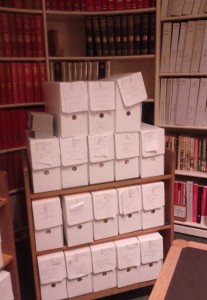
Some of the materials that our donor Reg is working on this week. 12 April 2014.
One of our "extra-engaged" donors, Reg, was in on Monday to assist in providing additional insight and 'value-added' description for a donation of records from a non-profit organization, for which he was the last executive director. Reg has been coming in on a regular basis to help with this donation, identifying individuals in photographs, and providing insight into the organization's historical activities. A quiet and unassuming visitor, Reg's observations about his activities and our ongoing dialogue has enriched our understanding of the organization's operations, and Reg has confessed to gaining a greater appreciation for the complexity of our work as archivists. His work with the records has also resulted in a deeper understanding of the activities of the organization and how such activities become documented through archival preservation.
- Suzanne, one of our archivists, managed to dedicate some time to reviewing proofs of the forthcoming issue of the archival journal Archivaria, for which she is managing editor. In addition to the seasonal ebb and flow of archival activities, Suzanne also has to juggle the demands of publishing an academic journal on a regular basis.
-
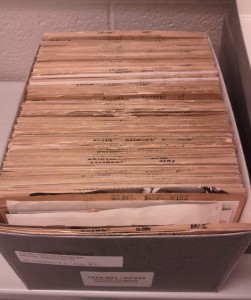
A typical box of photographic prints from the personality files of the Toronto Telegram.
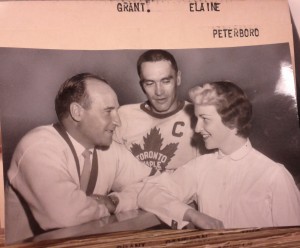
Contents of a typical personality file from the Toronto Telegram. This photo from 17 September 1958 depicts Elaine Grant interviewing Toronto Maple Leafs coach Billy Reay and team captain George Armstrong at a training camp in Peterborough.
In addition to archivists, our student assistants plugged away at a long-term project that involves indexing and cross-checking a series of photographic prints preserved by The Toronto Telegram. Already a year in, we've processed over 250 boxes of photographic prints, and just starting to hit the letter "G" in this alphabetically sorted collection of photographs of individuals (famous, infamous, local and obscure) who were published in The Toronto Telegram. A typical box can include a hundred or more files related to individuals who had their photograph published in the newspaper. Often accompanied by news clippings and occasionally correspondence and useful contextual information, these files will be a rich resource for historians, genealogists and social scientists alike. Indexing this series is tedious work that requires an attention to detail and a considerable amount of quality control but once completed, will greatly improve accessibility and searchability of our most-used archival fonds.
Tuesday
Tuesday was a bit of a scramble as there were staff meetings with our library colleagues that involved the department's archivists. As well, there were a number of research requests and in-house researchers that required some additional discussion and guidance.
- One of the department's soon-to-be donors followed up on earlier discussions about how best to donate his materials. This donor is also planning on giving the archives play-back equipment as part of his donation to facilitate digitization and access. This is a practice that we encourage as equipment can be donated for a tax receipt, and can be vital to supporting the Libraries' wider digitization and media migration efforts.
- Anna, one of our archivists, presented a brown bag session to her librarian colleagues about her experience within the archives with small-grant writing to help support digitization/processing projects. Small grants have been essential to building support and leveraging resources and additional funding for archival projects that otherwise would not achieve priority.
- In the afternoon Michael and Anna attended a staff meeting where they reported on some of the more recent processing projects and public interest in archives recently made available to researchers. They also presented with other committee members on activities related to digital initiatives, such as the Internet Archive.
- Our part-time contract archivist Jennifer was working on a recent accrual to the Barry Callaghan fonds. Jennifer works exclusively on processing donations and is a tremendous asset as the only dedicated staff member who can chip away at reducing our considerable backlog of donations.
Wednesday
On Wednesday we had a busy day with researchers (both physical and virtual) and research presentations. Some highlights included:
- a last-minute researcher looking to consult archival materials that could supplement an online publication about Canadian art history. Thankfully, this researcher emailed the department ahead of time with his request, so we were able to retrieve the material from the vault prior to his arrival.
- Several long-distance researchers preparing for their trip to the archives this summer. We tend to get a number of overseas scholars throughout the summer months consulting our holdings and early email correspondence ensures that once they book their flight, they'll have plenty of relevant and rich content to pour over.
- Julia, our archives technician, continues to follow up on researcher requests related specifically to permissions to publish digitized content acquired from the archives. For the most part, this related to Toronto Telegram photographs, for which York University holds the copyright. Art galleries, museums, other newspapers, community bloggers, students, film makers, writers, architects and publishers: everybody wants to republish photographs from the Telegram!
- Michael and Anna attended a joint panel discussion of librarians and faculty regarding Implementing Open Access. Our colleagues presented on a new pilot project we're running with a researcher depositing photographs she took during her doctoral research in Myanmar into our digital preservation platform Islandora.
- Our student assistants assisted Suzanne in quickly processing a transfer of university records that we received from the Research Tower earlier this month. University records tend to get transferred in the late spring and early summer as departments follow through on retention schedule deadlines.
-
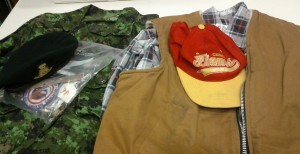
Costumes for Royal Canadian Air Farce characters Col. "Theresa" Stacy and Mike from Canmore. 22 November 2013.
Suzanne continues to chip away at the records of Abbott Ferguson Productions, creators of the Royal Canadian Air Farce, one of our largest and most complex donations, that she has been processing for several years over numerous accessions. Because the production company was so thorough it its documentation of its own practice, there is a lot to sift through, including operational records, scripts, production files, costumes, voluminous correspondence, research files and many, many, many recordings. Due to the length of the radio and television series (40 years!), Suzanne also has to wrestle with several generations of media formats used in the broadcast communities in radio and television. Thankfully, the content and the variety keeps things interesting.
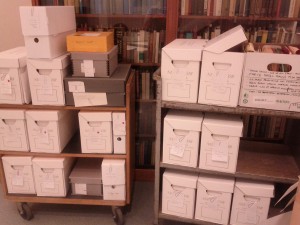
Just two of the work-in-progress carts for the Royal Canadian Air Farce.
- One student assistant (currently an iSchool graduate student) assisted Anna in searching the library catalogue and creating a listing of grey literature related to educational policy in the 1990s. This material is an accrual to an earlier donation and will be appraised next week. Another student assistant continued to index Toronto Telegram prints and helped fold some promotional newsletters for an event on Thursday.
- Suzanne assisted a research assistant fact-checking for a former university president working on an upcoming publication. Suzanne also managed some donor relations issues that intersected with requests from external researchers.
- In the early evening, Julia and Anna attending a memorial service at the Thomas Fisher Rare Book Library at the University of Toronto for a colleague, Don Sklepowich, who recently passed away. He was a remarkable human being and very talented audio technician and natural archivist. You can learn more about his life here and a photo album here.
Thursday
Thursday was rather scattered with archivists off-site at a public event, in meetings regarding fund-raising priorities and dealing with researchers and digitization projects. The day included:
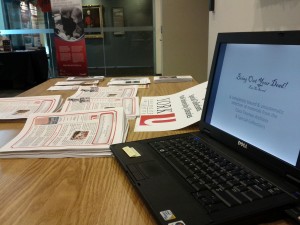
Archives Awareness Week event hosted by the Archives of Ontario, 10 April 2014.
- Anna spent the day at the Archives of Ontario, managing an information booth and participating in an all-day public event celebrating Archives Awareness Week. Events where several archives can participate to take advantage of public interest are good investments of our limited time. The Clara Thomas Archives was able to highlight its unique character and differentiate itself from the Archives of Ontario (which has been on the university campus for a little over 5 years) and make new connections with family historians and genealogists represented by the Ontario Genealogical Society.
- The archives had undergraduate students in to complete a final research paper based on the files of a lawyer involved in many twentieth-century civil liberties cases in Canada.
-
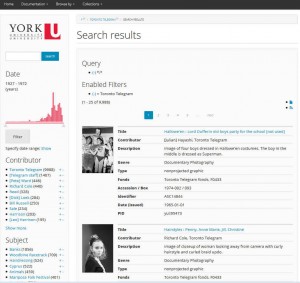
Scanned photographic negatives are added to York University Libraries' Islandora installation.
Julia worked with student assistants working in Bibliographic Services to clarify digitization practices and descriptive metadata standards related to the scanning of Toronto Telegram negatives suffering from vinegar syndrome. Digitized images from this project are uploaded to our Islandora digital repository.
- Anna spent some time in the late afternoon after the day's events experimenting with Open Refine to clean up metadata in anticipation of a migration project to occur over the summer months. The department is consolidating its accessioning and descriptive activities (currently managed through legacy Access databases and a custom designed software system) into an AtoM instance.
- Michael met with several library administrators in his capacity as department head to discuss fund-raising activities related to the archives.
-
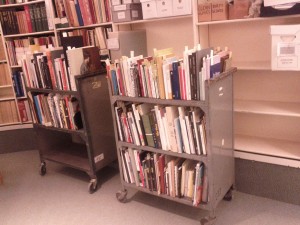
New additions to Special Collections from Acquisitions. 12 April 2014.
Julia resumed the challenge of finding shelf space for a cart full of new additions to the university's special collections. Space is always at a premium at any heritage institution, but with Special Collections our storage facilities are almost completely exhausted. With the end of the fiscal year purchases by subject librarians, many items flagged for our department (due to the scarcity, fragility, expense or composition of the item), new purchases can prove to be a challenge to shelve and store.
- Suzanne assisted a university administrator looking for archival photographs for a farewell party for a colleague. She also provided a faculty member, charged with writing a faculty history, with a list of potential archival and historical sources to inform their research.
-
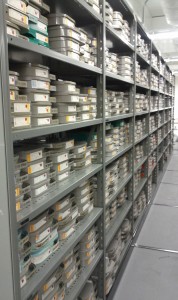
The first four seasons of The Dini Petty Show are held on 2" broadcast tapes.
Anna received an email from a biographer hoping to have numerous episodes of The Dini Petty Show digitized for their research. The broadcast tapes are held on 2" broadcast video tape. Thankfully, we have the machine that can play these kinds of formats (thanks to Ms. Petty's media connections!), although digitizing these tapes will take time and expertise. Looks like we have a new summer project!
- The department also managed some requests from faculty members trying to coordinate a 'day in the archives' for summer courses where classes will visit both the Archives of Ontario and the university archives in one lecture period.
Friday
Fridays in the spring tend to be quiet, with most of the campus community either studying for exams or recovering from the term and preparing for summer classes. Typically, the department spends the day tying up research requests from earlier in the week and clearing our desks of obligations in anticipation for a new week.
This week, our Friday included:
- Michael attended an MAAC (Major Awards Advisory Committee) meeting as the Libraries' representative.
-
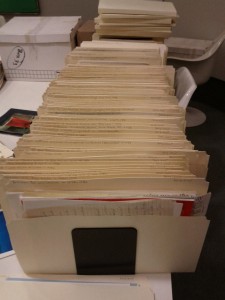
Typical scene while processing an archival donation. This is from the Donald S. MacDonald fonds. 11 February 2014.
Filing, filing, filing. Once we wrap up processing the physical archival material, our own documentation has to be filed. Friday tends to be a filing day: closing 2013 donation files, filing away research requests and correspondence received over the past few weeks, and gathering together documentation to be sent over to York's financial offices to ensure donors receive their 2013 tax receipts.
- Anna participated in a teleconference for the OCUL (Ontario College and University Libraries) Digital Curation Community to prioritize events for the 2014-2015 year. Made up of interested librarians, archivists and IT staff working in Ontario institutes of higher education, this community is focused on improving collaboration, knowledge sharing, and finding consortial solutions to challenges facing institutions engaged in digitization, digital preservation and knowledge dissemination.
- Suzanne advised a donor on possible homes for a large archive of records generated over 70 years by a non-profit organization. Although we may not be able to accept a donation of records (be it due to space, mandate or collection strength), we do try to direct potential donors to other archival institutions and universities who may be suitable homes.
- Michael and Anna prepared several accessions to be evaluated next week by our appraiser.
- As president of TAAG (Toronto Area Archivists' Group), Julia set aside some time to finish year-end reporting to our professional association the Archives Association of Ontario (AAO).
- Anna met with a librarian colleague about a presentation on curriculum integration, digital humanities and university prioritization of experiential learning to be held next week.
-
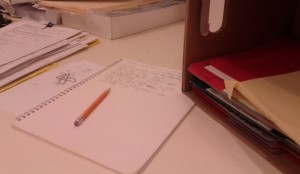
The work never ends! Suzanne's notes for one of the final accruals to the Royal Canadian Air Farce archives.
Suzanne continued to chip away at RCAF processing, setting aside duplicates and redundant film elements for culling and deaccessioning.
So! That was a quick overview of just some of our activities over the course of Archives Awareness Week.

